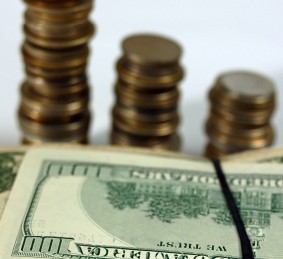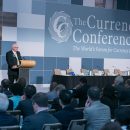Recently an associate sent me an article regarding the relative “cost” of different retail payment media – credit cards, debit cards and cash. While the article (reprinted below) makes a convincing argument for cash discounts, it neglects to understand or incorporate the real cost of cash in society. I am sure those of you reading this post will agree with me that there are hidden costs of cash that most of society never sees or thinks about. So, what is the cost of cash?
 To answer that question, let’s start at the top of the funding chain. First someone has to print a note before it can be circulated for general use. There is a cost to that – typically something less that $1 per piece of paper – exactly how much is influenced by design, anti-counterfeiting technologies, substrate (paper, plastic, cotton, etc.) and other factors. However those costs are not passed on to you and I – they are absorbed by the principal distributor – the central bank. Once the note makes it to the commercial bank, the cost of cash starts to affect us. A Bank or other public distributor of cash is required to pay interest for the money it borrows from the central bank, therefore we are charged higher rates of interest to borrow them from the financial institution. Even if we don’t borrow them and therefore avoid the interest cost, there are transportation costs, handling costs, storage costs, insurance costs, verification costs and distribution costs (e.g ATM’s) to name a few, that influence the cost of cash. So, when a retailer is asked to offer a cash discount, they are being asked to ignore the costs that they bear for accepting it. After all they still have to transport it to their financial institution, pay to have it verified in a deposit and then pay to order it back again so that they can make change for your next purchase.
To answer that question, let’s start at the top of the funding chain. First someone has to print a note before it can be circulated for general use. There is a cost to that – typically something less that $1 per piece of paper – exactly how much is influenced by design, anti-counterfeiting technologies, substrate (paper, plastic, cotton, etc.) and other factors. However those costs are not passed on to you and I – they are absorbed by the principal distributor – the central bank. Once the note makes it to the commercial bank, the cost of cash starts to affect us. A Bank or other public distributor of cash is required to pay interest for the money it borrows from the central bank, therefore we are charged higher rates of interest to borrow them from the financial institution. Even if we don’t borrow them and therefore avoid the interest cost, there are transportation costs, handling costs, storage costs, insurance costs, verification costs and distribution costs (e.g ATM’s) to name a few, that influence the cost of cash. So, when a retailer is asked to offer a cash discount, they are being asked to ignore the costs that they bear for accepting it. After all they still have to transport it to their financial institution, pay to have it verified in a deposit and then pay to order it back again so that they can make change for your next purchase.
So I ask you, is it really fair to say that cash is a less expensive payment media than debit and credit cards. If you work in the field of cash management, this is a topic worthy of debate.
By FLOYD NORRIS
Published: October 1, 2009What would you think of a proposal to create a consumer financial system in which the poor subsidize the well off? How about one that raises costs for those who do not use credit while imposing hefty penalties on those who use it unwisely?
If all that sounds good, read no further. That is the system we have now.
The current system is a maze of hidden fees. When you buy something for $100 with a piece of plastic, the store receives less than $100.
How much less depends on what kind of business the store has. (Food stores pay smaller fees than clothing stores.) It depends on what kind of market power the store has. (Home Depot) gets a bigger share than Fred’s Hardware.) It depends on whether the card is a credit or debit card. (Debit cards have lower fees.) It even depends on whether a credit card offers rewards. So when I use the Visa card that gives me airline miles, the merchant gets less than if I use a basic Visa card.
It seems reasonable to assume that the costs of all that are included in the prices charged to everyone. “Food stamp recipients pay the higher credit prices for things they buy with food stamps,†said Mallory Duncan, the general counsel of the National Retail Federation. “They are subsidizing the people who get miles.â€
Congress earlier this year tried to legislate away what it saw as some abuses by banks that layer on costs to consumers. Now it may take up a bill being pushed by retailers that want to pay lower fees for accepting cards.
Whether that would do anything for consumers is hard to tell, but this week 7-Eleven, the convenience store chain, descended on Capitol Hill with what it said were petitions signed by 1.6 million customers seeking such legislation.
All of this invites the basic question: If the store gets less when I use my credit card than it does when you pay cash, why should we pay the same price?
There is a prohibition, both in credit card agreements and in the laws of some states, against stores imposing a surcharge for using a credit card. But it is legal for them to offer cash discounts, even though that amounts to the same thing. But only gasoline stations — and a minority of them — offer such discounts in any quantity.
Why is that? Retailers claim their contracts with banks impose restrictions that make it difficult to offer such discounts without running afoul of the agreement and facing financial penalties. MasterCard says that it knows of no such rules, and that if a grocery store wants to put up a sign offering, say, a 2 percent discount for cash on all purchases, that there would be no problem.
In practice, some retailers of big-ticket items like furniture will quietly offer discounts if a customer will pay cash. But the vast majority of stores that take plastic — which is to say, nearly everybody these days — charge the same price for cash or credit.
It would be interesting to see what would happen if all rules restricting cash discounts were outlawed by Congress. Representative Peter Welch, Democrat of Vermont, has proposed doing just that by saying card companies and banks could not restrict a merchant’s discretion as to how to display or advertise the store’s prices.
The card companies say that would open the way for stores to mislead customers by posting one price and then charging more.
There are, of course, advantages for merchants who accept cards. The costs of cash include the possibility of theft, by employees or others, and in some cases, the cost of transporting cash to banks. Electronic transactions make record-keeping easier. So perhaps stores would not want to offer discounts. We would find out if that were true only if stores were confident of no restrictions on their doing so, and if customers began to seek such discounts.
The card companies argue that there are few cash discounts because merchants think customers are likely to spend more with cards and would be offended if they were asked to pay more. “They don’t want to annoy their customers,†said Shawn Miles, MasterCard’s head of global public policy.
There is a little evidence what would happen if the rules were changed. When Australia adopted rules that restricted the fees card companies could charge to merchants and allowed surcharges for use of credit, a study by the Australian central bank concluded that users of premium cards, who paid their charges in full every month, saw the effective subsidy they received on a $100 purchase reduced to $1.10, from $1.30. The fees paid by customers for cards that offer cash back, or miles on an airline, might well increase.
The retailers have supported the Welch bill, but they seem to be putting their most vigorous efforts into backing bills introduced by Representative John Conyers, the Michigan Democrat who is chairman of the Judiciary Committee, and Senator Richard J. Durbin, an Illinois Democrat, that would suspend antitrust law and let merchants band together to negotiate card fees with credit card companies. The Senate version of the bill would establish a government panel to decide on fees if the banks and merchants could not agree.
The card companies think that is a bad idea, and say 7-Eleven misled customers into signing the petition. “The merchants want to pass on the cost of accepting those cards to consumers,†said Bill Sheedy, Visa’s group president for the Americas. “They want to lower their costs and increase their profits.â€
It seems reasonable to think some customers may not have completely understood the issue before they signed. Here is what the petition said: “Help us fight unfair credit card fees. Ask Congress to stop credit card companies from charging unfair transaction fees to the businesses you shop.†Just why are those fees unfair? The petition did not explain.
It was just 51 years ago that Bank of America introduced the BankAmericard, which became Visa. Before that, few people had access to plastic, and consumer debt was about 13 percent of annual personal income. Now the figure is 21 percent.
There are advantages and disadvantages to all that debt, even if the disadvantages have seemed most obvious during the long recession that was partly caused by excessive indebtedness at all levels of society.
But it does seem absurd to have a system that requires people who do not use credit to subsidize those who do. You know there is something wrong when a middle-class person can get a part of his purchases refunded by the bank, or can collect miles good for free airline tickets, while paying the same price as a poor person who can get none of those benefits.










